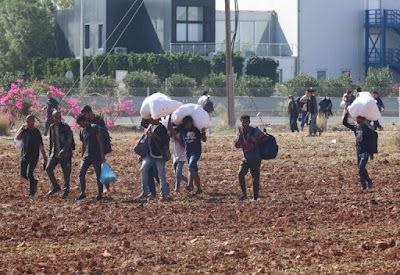Cyprus Mail 5 September 2023 - by Elias Hazou
The government is working to highlight Cyprus as an unattractive destination for migration, ministers told the ad hoc House committee on demographics on Tuesday.
Interior Minister Constantinos Ioannou said within the next few weeks, competent ministers will meet to find ways on “how we can contribute to making Cyprus an unattractive destination” on the one hand and how to enhance the inclusion of migrants on the other.
He said that through interviews with asylum seekers, it has emerged there is a lot of misinformation about what they expect to find when they arrive in Cyprus.
For this reason, Cyprus has proposed to the EU to include in the Eastern Mediterranean Action Plan an information campaign in African countries on what those who attempt the dangerous journey are can expect to encounter on arrival.
He said the island has already launched a campaign to this effect through social media and the internet in three countries: Congo, Cameroon and Nigeria.
Through it the risks of irregular migration are presented and a realistic picture of the migration situation in Cyprus given through authentic stories of migrants and interviews with officials. The myths and lies of smugglers are reported, he added, who falsely present Cyprus as the first intermediate destination from which a move can be made to other European member states.
The relevant website on the subject is: talktruthaboutcyprus.com.
Deputy Minister for Social Welfare Marilena Evangelou said any such actions to put off migrants must be in accordance with the law, international treaties and a humanitarian approach.
Evangelou homed in on the problem of unaccompanied minors – which currently total 1,071.
These children live in state-run shelters, and a few with foster families. The ministry aims to create more such shelters within communities, to avoid ghettoisation and to better integrate these minors.
Condemning the recent violence directed at migrants as “images of shame”, Disy MP Prodromos Alambritis said the migration issue “has reached enormous proportions, the numbers are relentless. Six per cent of the population are political asylum seekers. Cyprus must handle an unbearable burden, the heaviest in Europe where the percentage is around 1 per cent.
“But violence can never be the answer, nor can anyone take the law into their own hands. The state must undertake its responsibilities and guarantee safety for all. At the same time, those living in our country should respect the place that hosts them.”
In a bid to dispel ‘disinformation’ on the subject, the MP also sought to clarify how much asylum seekers receive in benefits. He said they receive a €261 stipend, plus €100 for rent where applicable.
Committee chair Linos Papayiannis, of far-right Elam, welcomed the marked increase in the number of asylum applications being examined.
The MP said Elam is opposed to the government’s efforts to integrate migrants, noting the lack of space to hold failed asylum seekers.
Many areas in Cyprus have become “hostage” to demographic alteration, he said.
Likewise condemning any violence, Papayiannis harangued the other political parties for “targeting” Elam over the events of the past few days.
Ioannou also repeated that there is reason for optimism as for the first time the balance between arrivals and departures of migrants has tilted toward the latter.
The number of asylum applications has declined by 51 per cent during the last six months compared to the same period last year, Ioannou said.
At the same time, the number of people being returned to their countries has increased by 50 per cent.
Generally speaking, the signs are “encouraging,” he added.
“Specifically, over the last six months, and whereas last year we had about 12,000 asylum seekers, this year approximately 5,800 have come,” he said.
As for returns during the last five to six months, Ioannou said that last year they numbered 3,200, rising to 4,700 this year.
He said the number of asylum applications examined per month stands at around 2,000 – from 1,000 last year. It now takes about three months for an application to be examined and for the appeal before the administrative court – compared to the nine months it used to take.
The minister also stressed the importance of cracking down on human trafficking rings. He said a dedicated committee, set up a month ago, is currently “processing” information it receives from the police.
Two weeks ago the police busted one trafficking ring, though the government is aware that other rings exist. More arrests are on the way, promised Ioannou.
Explaining the significance of speeding up asylum applications, the minister said “this means that benefits stop, as does the right to access the labour market. Once an application is denied, the interior minister provides a programme for voluntary returns, offering incentives [to failed asylum seekers] to depart Cyprus.
“However, many choose to stay here and work illegally.”
According to Ioannou, deportations remain a sticky issue.
“Deportations – essentially forced returns – are our weak spot because of the lack of holding facilities. At the moment the available holding space is for 126 persons.”
This, in turn, bottlenecks the returns procedures.
The minister said that a new ‘pre-departure’ centre – currently under construction – will be ready in two years’ time.
“Had we this facility right now, we would be speaking of a far higher number of deportations,” he said.
Asked whether authorities can deport Syrian nationals, Ioannou said no as Syria is still considered a conflict zone and therefore unsafe.
“No country in the world,” he added, “has returned a Syrian back to Syria. It’s not a matter that concerns Cyprus alone.”
The minister recalled how a month ago, while attending the informal council of EU home affairs ministers in Spain, he had said that the unsafe status of Syria – 11 years since the outbreak of conflict there – should be altered for migration policy purposes.
